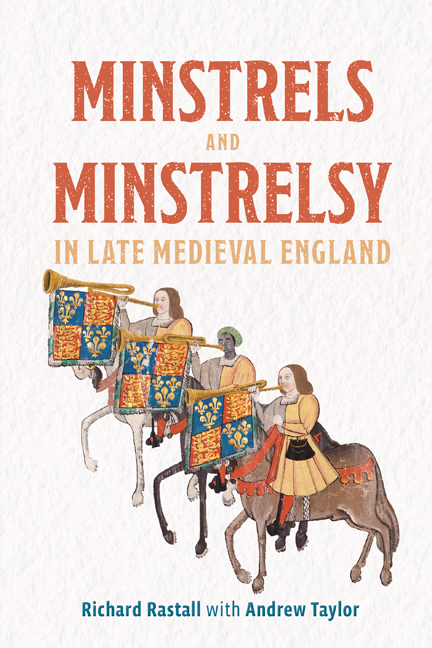Book contents
- Frontmatter
- Dedication
- Contents
- List of illustrations
- List of music examples
- List of abbreviations
- A note on references
- A note on money
- A note on dates
- Preface
- Acknowledgments
- Part I Minstrels and Minstrelsy in the Elite Households
- Part II Urban Minstrelsy
- Part III On the Road
- Part IV Minstrel Performance
- Envoi
- Bibliography
- Index
11 - The enigma of the minstrels’ songs
Published online by Cambridge University Press: 09 January 2024
- Frontmatter
- Dedication
- Contents
- List of illustrations
- List of music examples
- List of abbreviations
- A note on references
- A note on money
- A note on dates
- Preface
- Acknowledgments
- Part I Minstrels and Minstrelsy in the Elite Households
- Part II Urban Minstrelsy
- Part III On the Road
- Part IV Minstrel Performance
- Envoi
- Bibliography
- Index
Summary
Andrew Taylor
From a literary perspective, the songs and recitation of the medieval minstrels are an enigma. In an age when reading was still a considerable social accomplishment, the minstrels must have played a crucial role in circulating all manner of stories and songs. One account describes them, not unreasonably, as ‘the primary agents for the mass publication of narrative poetry’ in medieval England. In various tales, minstrels vaunt their range of amusements they could offer, including the instruments they could play and the songs they could sing, while preachers and moralists proclaim that they will tell of greater heroes than those praised by the minstrels, and proceed to list who these heroes are: Roland and Charlemagne, Octavian, Isumbras, Guy of Warwick, and Bevis of Southampton. It might seem, then, that it should be easy enough to establish the minstrel repertory: what songs they sang, what stories they told, how long they performed for, and in what languages. Yet it proves extraordinarily difficult to do so.
That minstrels sang or recited chivalric compositions of some kind seems clear, but just what these compositions were and how closely they resemble the surviving texts of chansons de geste or romances remain highly controversial questions. It is now widely (but not entirely) accepted that the oral tags and formulae in the surviving Middle English romances and Old English poems, notably Beowulf, are actually literary devices and that the surviving poems bear only a remote relation to any minstrel or scop's performance. Whether the same can be said for the chansons de geste, above all the Chanson de Roland, remains more hotly disputed. The references to minstrels singing cannot be dismissed. William the Conqueror's household minstrel was said to have sung of Roland and Oliver as he rode ahead of the Norman forces at Hastings. Preachers complained that a ‘great deal is sung about Roland and Oliver’ or that ‘the voice of the minstrel sitting on the Petit Pont [leading to the Ile de la Cite in Paris] tells how the mighty soldiers of long ago, such as Roland, Oliver, and the rest, were slain in battle’ and so moves the people to tears. What is not clear is how close these songs were to the surviving texts of La Chanson de Roland or the other texts that have come down to us.
- Type
- Chapter
- Information
- Minstrels and Minstrelsy in Late Medieval England , pp. 235 - 268Publisher: Boydell & BrewerPrint publication year: 2023

